-
IP addresses are NOT logged in this forum so there's no point asking. Please note that this forum is full of homophobes, racists, lunatics, schizophrenics & absolute nut jobs with a smattering of geniuses, Chinese chauvinists, Moderate Muslims and last but not least a couple of "know-it-alls" constantly sprouting their dubious wisdom. If you believe that content generated by unsavory characters might cause you offense PLEASE LEAVE NOW! Sammyboy Admin and Staff are not responsible for your hurt feelings should you choose to read any of the content here. The OTHER forum is HERE so please stop asking.
You are using an out of date browser. It may not display this or other websites correctly.
You should upgrade or use an alternative browser.
You should upgrade or use an alternative browser.
Chitchat What so protestors in HK want now...
- Thread starter tanwahtiu
- Start date
they all want to tiu tanwahtiu.
They want independence..and the end to chi com rule imagine being ruled over by retarded drug addicts like Mr waiting to be Fucked.....no wonder the hongkies are revoltingthey all want to tiu tanwahtiu.
Last edited:
They want Amdk to be their master, many CBs wet wet from waving American Flag.
Good idea for Hong Kong to be the 52nd state of Yankee land. Better than being under the control of chicomsThey want Amdk to be their master, many CBs wet wet from waving American Flag.
Sad that it's nothing but a pipe dream...to be liberated from chicom rule n the yanks will do fuck all
Hong Kong protesters ask US President Donald Trump to 'liberate' Chinese territory as clashes erupt
Updated about an hour ago
Thousands of protesters in Hong Kong have urged US President Donald Trump to "liberate" the semiautonomous Chinese territory during a peaceful march to the US Consulate, but violence broke out later in the business and retail district after protesters vandalised subway stations, set fires and blocked traffic.

Hong Kong has been rocked by three months of unrest sparked by a proposed law that would have allowed criminal suspects to be sent to mainland China for trial.
Many saw the extradition bill as a glaring example of the erosion of civil liberties and rights promised under a "one country, two systems" framework when the former British colony returned to Chinese rule in 1997.
Hong Kong's Government promised this past week to formally withdraw the bill, but that failed to appease the demonstrators, who had widened their demands to include calls for direct elections for the city's leaders and an independent probe into alleged police brutality against protesters.
 PHOTO Protesters waved American flags as they marched to the US Consulate. REUTERS: KAI PFAFFENBACH
PHOTO Protesters waved American flags as they marched to the US Consulate. REUTERS: KAI PFAFFENBACH
Protesters on Sunday urged Washington to pass a bill, known as the Hong Kong Democratic and Human Rights Act, to support their cause.
The bill proposes sanctions against Hong Kong and Chinese officials found to suppress democracy and human rights in the city, and could also affect Hong Kong's preferential trade status with the US.
A group of protesters sang The Star-Spangled Banner before handing over an appeal letter to a US Consulate official.
 PHOTO A US Consulate representative, left, receives a letter from protesters in Hong Kong. AP: KIN CHEUNGUS citizens urged to exercise more caution
PHOTO A US Consulate representative, left, receives a letter from protesters in Hong Kong. AP: KIN CHEUNGUS citizens urged to exercise more caution
 PHOTO The formal withdrawal of the extradition bill failed to stop protests this weekend. AP: VINCENT YU
PHOTO The formal withdrawal of the extradition bill failed to stop protests this weekend. AP: VINCENT YU
Just before the rally ended, violence erupted after riot police detained several people and cleared a crowd from the nearby Central subway station.
Angry protesters smashed glass windows, sprayed graffiti and started a fire at one of the station's exits.
The Government said protesters also set street fires and blocked traffic at some thoroughfares.
In the type of cat-and-mouse battle that has characterised the summer-long protests, riot police pursued groups of protesters down streets, but they kept regrouping.
Police fired multiple rounds of tear gas in the Causeway Bay shopping area after protesters heckled them and refused to leave.
They also searched dozens of young people on the street and inside subway stations.
 PHOTO Battles between protesters and riot police escalated once again in the Mong Kok district this weekend. REUTERS: KAI PFAFFENBACH
PHOTO Battles between protesters and riot police escalated once again in the Mong Kok district this weekend. REUTERS: KAI PFAFFENBACH
At the Mong Kok police station, clashes took place for a third straight night. Police fired projectiles at an angry crowd that was shining laser beams, and several people were detained.
The US State Department said in a travel advisory on Friday that Beijing had undertaken a propaganda campaign, "falsely accusing the United States of fomenting unrest in Hong Kong".
It said US citizens and embassy staff were targeted and urged them to exercise increased caution.
Some American legislators are pressing Mr Trump to take a tougher stand on Hong Kong.
But the President has suggested it is a matter for China to handle, though he also has said no violence should be used.
Political analysts suggested Mr Trump's response was muted because he did not want to disrupt talks with China over their tariff war.
US House Speaker Nancy Pelosi said in a statement on Wednesday Hong Kong residents deserved real autonomy and freedom from fear.
She urged an end to police violence against protesters and said Congress looked forward to "swiftly advancing" the Hong Kong bill.
AP
Hong Kong protesters ask US President Donald Trump to 'liberate' Chinese territory as clashes erupt
Updated about an hour ago
Thousands of protesters in Hong Kong have urged US President Donald Trump to "liberate" the semiautonomous Chinese territory during a peaceful march to the US Consulate, but violence broke out later in the business and retail district after protesters vandalised subway stations, set fires and blocked traffic.

Hong Kong has been rocked by three months of unrest sparked by a proposed law that would have allowed criminal suspects to be sent to mainland China for trial.
Many saw the extradition bill as a glaring example of the erosion of civil liberties and rights promised under a "one country, two systems" framework when the former British colony returned to Chinese rule in 1997.
Hong Kong's Government promised this past week to formally withdraw the bill, but that failed to appease the demonstrators, who had widened their demands to include calls for direct elections for the city's leaders and an independent probe into alleged police brutality against protesters.

Protesters on Sunday urged Washington to pass a bill, known as the Hong Kong Democratic and Human Rights Act, to support their cause.
The bill proposes sanctions against Hong Kong and Chinese officials found to suppress democracy and human rights in the city, and could also affect Hong Kong's preferential trade status with the US.
A group of protesters sang The Star-Spangled Banner before handing over an appeal letter to a US Consulate official.


Just before the rally ended, violence erupted after riot police detained several people and cleared a crowd from the nearby Central subway station.
Angry protesters smashed glass windows, sprayed graffiti and started a fire at one of the station's exits.
The Government said protesters also set street fires and blocked traffic at some thoroughfares.
In the type of cat-and-mouse battle that has characterised the summer-long protests, riot police pursued groups of protesters down streets, but they kept regrouping.
Police fired multiple rounds of tear gas in the Causeway Bay shopping area after protesters heckled them and refused to leave.
They also searched dozens of young people on the street and inside subway stations.

At the Mong Kok police station, clashes took place for a third straight night. Police fired projectiles at an angry crowd that was shining laser beams, and several people were detained.
The US State Department said in a travel advisory on Friday that Beijing had undertaken a propaganda campaign, "falsely accusing the United States of fomenting unrest in Hong Kong".
It said US citizens and embassy staff were targeted and urged them to exercise increased caution.
Some American legislators are pressing Mr Trump to take a tougher stand on Hong Kong.
But the President has suggested it is a matter for China to handle, though he also has said no violence should be used.
Political analysts suggested Mr Trump's response was muted because he did not want to disrupt talks with China over their tariff war.
US House Speaker Nancy Pelosi said in a statement on Wednesday Hong Kong residents deserved real autonomy and freedom from fear.
She urged an end to police violence against protesters and said Congress looked forward to "swiftly advancing" the Hong Kong bill.
AP
they just want easy asylum lah. no need to compete against illegal immigrants being detained at the border and butt-itchy asylum seekers like anus yee.They want independence..and the end to chi com rule imagine being ruled over by retarded drug addicts like Mr waiting to be Fucked.....no wonder the hongkies are revolting
https://www.congress.gov/bill/116th-congress/senate-bill/1824
https://www.congress.gov/bill/116th-congress/house-bill/3289
https://www.govtrack.us/congress/bills/116/s1838
US Congress is back in session this week.
https://www.congress.gov/bill/116th-congress/house-bill/3289
https://www.govtrack.us/congress/bills/116/s1838
US Congress is back in session this week.

東亞病夫 putting up a good fight for so called democracy have to salute them...I am really ashamed

Better hongkie cantos as migrants than mudslimes n ah nehs n ah tiongsthey just want easy asylum lah. no need to compete against illegal immigrants being detained at the border and butt-itchy asylum seekers like anus yee.
東亞病夫 putting up a good fight for so called democracy have to salute them...I am really ashamed
View attachment 64302
Communist is communist... no difference between ang moh or Asian.

Don't be fooled by the veneer of 'prosperity' in the major cities in China. The oppression is real. Mainland police have been caught red-handed disguising as Hong Kong police to stir shit.
This is what the chicoms do to control information
Seven ways China's media took on HK protests
By Kerry Allen
BBC Monitoring
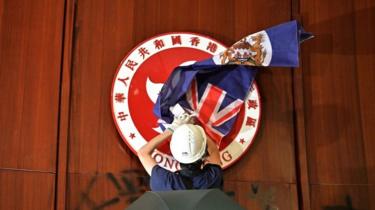 Image copyright GETTY IMAGES
Image copyright GETTY IMAGES
When the Hong Kong protests first started, there was silence from China's state media.
But that changed as violence escalated to unprecedented levels and now China is trying to match the intensity of the demonstrations with an aggressive and creative media campaign of its own.
On social networks like Weibo and WeChat, there have been four key points - conveyed subtly and explicitly - that China really wants to get across:
1. A policy of silence
The protests were sparked by a controversial and now suspended extradition bill, which would have allowed Hong Kong to send criminal suspects to the mainland. China's first reaction was ... to say nothing.
Since then it has become a far broader movement calling for democratic reform as well as an investigation into police brutality - it's a rallying cry against China and perceived encroachments by Beijing.
Even when large-scale protests involving hundreds of thousands of people made international headlines on 9 June, Chinese-language media was silent. As weeks passed and with protesters reportedly growing to two million at their peak on 16 June, China muted all conversation.
This is partly down to the traditional tool of outright censorship. Posts containing terms related to the protests, including "Hong Kong", "Hong Kong government", and even specific terms like "1.03 million" (the reported number of protestors on 9 June), "Causeway Bay" and "Victoria Park" (areas where protestors were gathering) were censored from 9 June on the Sina Weibo microblog.
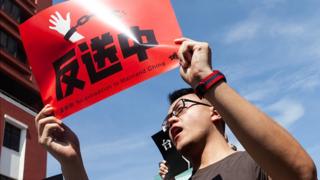 Image caption For weeks, the phrase "反送中", meaning "no extradition to mainland China", was an outright censored term.
Image caption For weeks, the phrase "反送中", meaning "no extradition to mainland China", was an outright censored term.
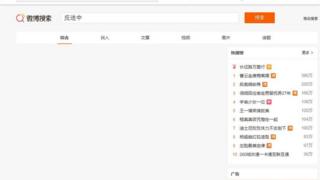 Image caption A Sina Weibo search on 11 June showed no results for anti-extradition slogans
Image caption A Sina Weibo search on 11 June showed no results for anti-extradition slogans
Chinese media even went so far as to say the bill had met with a positive reception, with news agency Xinhua declaring the extradition bill was "supported by mainstream public opinion". English-language papers acknowledged "small scale" demonstrations but said that hundreds of thousands "had pledged support in a city-wide signature campaign.
Still, no Chinese-language media made mention of protests. But it soon became clear this policy wasn't working.
2. Battle between 'foreign agents' and 'the motherland'
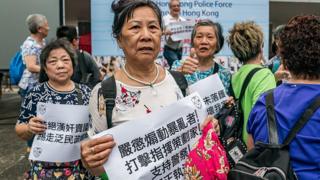 Image caption Official media originally said that protests involved parents against US interference, supporting their local police force
Image caption Official media originally said that protests involved parents against US interference, supporting their local police force
Then on 15 June, the extradition bill was suspended by the Hong Kong government - in an apparent victory for popular protest. At that point China's foreign ministry voiced strong criticism, and began blaming the US.
Just a few days later, when demonstrators defaced China's Liaison Office in Hong Kong, government mouthpiece People's Daily launched an angry front page editorial saying "the central authority will not be challenged".
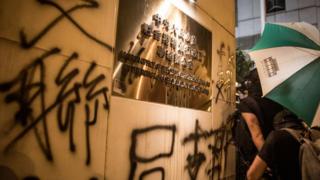 Image caption Symbols of Chinese government have been attached and vandalised during the unrest
Image caption Symbols of Chinese government have been attached and vandalised during the unrest
Suddenly, en masse, state media began reporting on "radical protesters… destroying facilities, defacing the national anthem, and painting graffiti that insulted the country and the nation".
A policy of censorship was transformed into a sustained attempt to own the narrative on Hong Kong. More than 160,000 Weibo users used the hashtag #TheCentralAuthorityWillNotBeChallenged, and so China's media machine sprung into action.
Domestically and overseas, media also began replicating the slogan "Hong Kong is China's Hong Kong", especially in response to UK politicians' criticism of China's intervention in the Hong Kong protests.
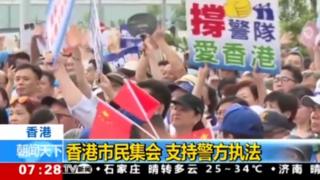 Image caption TV stations started giving coverage to groups of protesters in favour of the police - but ignored those protesting the extradition bill
Image caption TV stations started giving coverage to groups of protesters in favour of the police - but ignored those protesting the extradition bill
Throughout the protests, media highlighted individuals who spoke up for mainland China and the protests have been labelled as pro-Western "colour revolutions" - a reference to the pro-democracy wave that overthrew governments in former Soviet nations in the 2000s.
Perceived double standards in Western media became a prominent theme at this time.
3. Battle of good-versus evil
When on 21 July, mobs of men wearing white-shirts suddenly appeared in Hong Kong's Yuen Long district and started beating black-clothed protesters, they were immediately painted in Chinese media as ordinary disgruntled members of the public.
In Hong Kong, they were painted as groups of thugs affiliated to gangsters called triads - but in China's re-telling of this event the white versus black motif was immediately transformed into a dialogue of good versus evil.
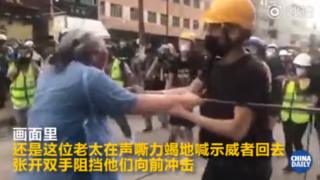 Image caption Footage of an elderly woman shrieking and backing away from protesters helped paint a picture black-clothed protesters were dangerous
Image caption Footage of an elderly woman shrieking and backing away from protesters helped paint a picture black-clothed protesters were dangerous
The increasingly violent confrontations allowed China to pick through imagery from the protests and paint those on the streets as radical and violent extremists.
Social media accounts began springing up on Facebook and Twitter from users with associations to the Chinese government, in a co-ordinated effort to amplify this dialogue overseas.
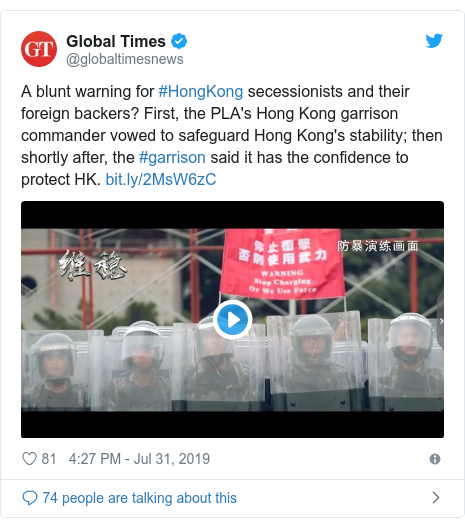 Image Copyright @globaltimesnews @GLOBALTIMESNEWS Report
Image Copyright @globaltimesnews @GLOBALTIMESNEWS Report
Both Facebook and Twitter said they had removed a number of accounts that they believed were being used as part of a state-backed misinformation campaign.
Their claims were credible, given that China has proven domestically that it has the power to influence social media discussion on a huge-scale.
China has a well-documented history of recruiting what are known as the wu mao or "50-Cent Party": social media commentators who are paid a small amount of money to manipulate public opinion on a large scale online.
4. Using powerful symbols from history
From the Cultural Revolution to the British Miners' strike, historical precedent has been one tool to influence the narrative on Hong Kong in China's favour.
Media began labelling four veteran Hong Kong pro-democracy figures as a new "Gang of Four"- drawing on the dreaded language of the Cultural Revolution, it was a term that referred to the political faction blamed for the worst excesses of that time in China's history.
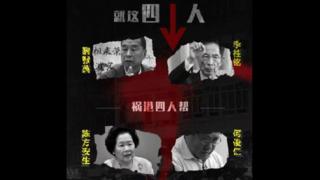 Image caption Jimmy Lai, Martin Lee, Anson Chan and Albert Ho have been labelled by official media as China's new "gang of four"
Image caption Jimmy Lai, Martin Lee, Anson Chan and Albert Ho have been labelled by official media as China's new "gang of four"
The circumstances of Hong Kong's handover frequently cropped up - a reminder that post-1997 the UK should have no involvement in Hong Kong.
Increasingly, media have shared footage of what they say are Western nations' own poor handling of protests and accused such countries of hypocrisy.
One example on 21 August showed official broadcaster CCTV sharing footage of British police officers being heavy-handed with protestors during the 1984 UK miners' strike and the 2011 England riots.
5. The foreigners who love China
A stream of foreigners who have nothing but praise for China and hard words for Hong Kong's protesters have also featured prominently in Chinese media.
Foreigners who are filmed arguing with pro-democracy protesters in favour of Chinese sovereignty are the ones most singled out for favour.
Apparently spontaneous vox pops with foreigners expressing support for China also have begun to feature heavily on Chinese state media social media feeds.
The Australian man, only identified as "Paul", has been praised by official media for telling protesters: "It is recognised all around the world that Hong Kong and Taiwan are actually part of China. That's actually recognised. Everyone, every country recognises it".
Pro-China rallies organised by overseas Chinese in the UK, Germany, Canada and Australia, for example, have received fulsome coverage. The counter rallies get little mention.
6. China's brand 'witch hunt'
An online assault against major luxury brands that had somehow failed to list Hong Kong, Macau or Taiwan as part of greater China also became a force to reckon with.
At its height - between 8 and 15 August - a series of global brands from Versace to Calvin Klein and Swarovski were targeted by social media users and were forced to issue apologies.
With the ever-present threat of a boycott in one of the world's most lucrative markets, the apologies were fulsome. Versace said it "loves China" and leading brands over and over again expressed their support for One China.
It was not the first time that social media users took up nationalist cudgels against major brands and state media lost no opportunity to report this.
7. Celebrity 'endorsements'
The government has also subtly underlined the power it has over celebrities, by highlighting where stars have shown their support for Beijing's stance.
Many stars including boyband member Jackson Yee and model Liu Wen severed their endorsement of companies that came under fire by China's press, possibly to avoid being implicated in the issue.
Others began showing they were good role models by jumping on a bandwagon of support for the government's message.
Liu Yifei, the actress set to play Mulan in the upcoming Disney film, received mass criticism on overseas social networks, after users highlighted that she had reposted a viral pro-police comment on 16 August on Sina Weibo.
But Ms Liu was only one of many celebrities, who shared a post by the official CCTV, saying "I also support the Hong Kong police".
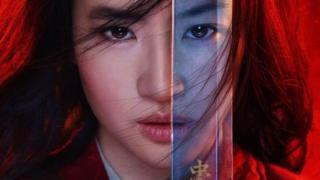 Image caption Activists outside China used the hashtag #BoycottMulan after Liu Yifei posted posted her support for the Hong Kong police
Image caption Activists outside China used the hashtag #BoycottMulan after Liu Yifei posted posted her support for the Hong Kong police
Many on Twitter saw this as her toeing the Chinese government line in order to curry favour with China, and were critical, given she is an American citizen.
Mainland celebrities have been put on a pedestal from the state for supporting Beijing's message; but China has also highlighted where heavyweight Hong Kong celebrities have reinforced their support for Beijing, including actor Jackie Chan and singer Eric Suen.
On 13 August, Chan told CCTV that he was a "guard" of the national flag, and that he felt events in Hong Kong were "sad and depressing".
BBC Monitoring reports and analyses news from TV, radio, web and print media around the world. You can follow BBC Monitoring on Twitter and Facebook.
Seven ways China's media took on HK protests
By Kerry Allen
BBC Monitoring

When the Hong Kong protests first started, there was silence from China's state media.
But that changed as violence escalated to unprecedented levels and now China is trying to match the intensity of the demonstrations with an aggressive and creative media campaign of its own.
On social networks like Weibo and WeChat, there have been four key points - conveyed subtly and explicitly - that China really wants to get across:
- the black-clothed protesters are violent extremists who are Western lackeys
- there is support from many across Hong Kong for China - "the motherland" - and for the police
- Hong Kong needs to be reminded of China's military might
- Hong Kong is part of One China.
1. A policy of silence
The protests were sparked by a controversial and now suspended extradition bill, which would have allowed Hong Kong to send criminal suspects to the mainland. China's first reaction was ... to say nothing.
Since then it has become a far broader movement calling for democratic reform as well as an investigation into police brutality - it's a rallying cry against China and perceived encroachments by Beijing.
Even when large-scale protests involving hundreds of thousands of people made international headlines on 9 June, Chinese-language media was silent. As weeks passed and with protesters reportedly growing to two million at their peak on 16 June, China muted all conversation.
This is partly down to the traditional tool of outright censorship. Posts containing terms related to the protests, including "Hong Kong", "Hong Kong government", and even specific terms like "1.03 million" (the reported number of protestors on 9 June), "Causeway Bay" and "Victoria Park" (areas where protestors were gathering) were censored from 9 June on the Sina Weibo microblog.


Chinese media even went so far as to say the bill had met with a positive reception, with news agency Xinhua declaring the extradition bill was "supported by mainstream public opinion". English-language papers acknowledged "small scale" demonstrations but said that hundreds of thousands "had pledged support in a city-wide signature campaign.
Still, no Chinese-language media made mention of protests. But it soon became clear this policy wasn't working.
2. Battle between 'foreign agents' and 'the motherland'

Then on 15 June, the extradition bill was suspended by the Hong Kong government - in an apparent victory for popular protest. At that point China's foreign ministry voiced strong criticism, and began blaming the US.
Just a few days later, when demonstrators defaced China's Liaison Office in Hong Kong, government mouthpiece People's Daily launched an angry front page editorial saying "the central authority will not be challenged".

Suddenly, en masse, state media began reporting on "radical protesters… destroying facilities, defacing the national anthem, and painting graffiti that insulted the country and the nation".
A policy of censorship was transformed into a sustained attempt to own the narrative on Hong Kong. More than 160,000 Weibo users used the hashtag #TheCentralAuthorityWillNotBeChallenged, and so China's media machine sprung into action.
Domestically and overseas, media also began replicating the slogan "Hong Kong is China's Hong Kong", especially in response to UK politicians' criticism of China's intervention in the Hong Kong protests.

Throughout the protests, media highlighted individuals who spoke up for mainland China and the protests have been labelled as pro-Western "colour revolutions" - a reference to the pro-democracy wave that overthrew governments in former Soviet nations in the 2000s.
Perceived double standards in Western media became a prominent theme at this time.
3. Battle of good-versus evil
When on 21 July, mobs of men wearing white-shirts suddenly appeared in Hong Kong's Yuen Long district and started beating black-clothed protesters, they were immediately painted in Chinese media as ordinary disgruntled members of the public.
In Hong Kong, they were painted as groups of thugs affiliated to gangsters called triads - but in China's re-telling of this event the white versus black motif was immediately transformed into a dialogue of good versus evil.

The increasingly violent confrontations allowed China to pick through imagery from the protests and paint those on the streets as radical and violent extremists.
Social media accounts began springing up on Facebook and Twitter from users with associations to the Chinese government, in a co-ordinated effort to amplify this dialogue overseas.
Both Facebook and Twitter said they had removed a number of accounts that they believed were being used as part of a state-backed misinformation campaign.
Their claims were credible, given that China has proven domestically that it has the power to influence social media discussion on a huge-scale.
China has a well-documented history of recruiting what are known as the wu mao or "50-Cent Party": social media commentators who are paid a small amount of money to manipulate public opinion on a large scale online.
4. Using powerful symbols from history
From the Cultural Revolution to the British Miners' strike, historical precedent has been one tool to influence the narrative on Hong Kong in China's favour.
Media began labelling four veteran Hong Kong pro-democracy figures as a new "Gang of Four"- drawing on the dreaded language of the Cultural Revolution, it was a term that referred to the political faction blamed for the worst excesses of that time in China's history.

The circumstances of Hong Kong's handover frequently cropped up - a reminder that post-1997 the UK should have no involvement in Hong Kong.
Increasingly, media have shared footage of what they say are Western nations' own poor handling of protests and accused such countries of hypocrisy.
One example on 21 August showed official broadcaster CCTV sharing footage of British police officers being heavy-handed with protestors during the 1984 UK miners' strike and the 2011 England riots.
5. The foreigners who love China
A stream of foreigners who have nothing but praise for China and hard words for Hong Kong's protesters have also featured prominently in Chinese media.
Foreigners who are filmed arguing with pro-democracy protesters in favour of Chinese sovereignty are the ones most singled out for favour.
Apparently spontaneous vox pops with foreigners expressing support for China also have begun to feature heavily on Chinese state media social media feeds.
The Australian man, only identified as "Paul", has been praised by official media for telling protesters: "It is recognised all around the world that Hong Kong and Taiwan are actually part of China. That's actually recognised. Everyone, every country recognises it".
Pro-China rallies organised by overseas Chinese in the UK, Germany, Canada and Australia, for example, have received fulsome coverage. The counter rallies get little mention.
6. China's brand 'witch hunt'
An online assault against major luxury brands that had somehow failed to list Hong Kong, Macau or Taiwan as part of greater China also became a force to reckon with.
At its height - between 8 and 15 August - a series of global brands from Versace to Calvin Klein and Swarovski were targeted by social media users and were forced to issue apologies.
With the ever-present threat of a boycott in one of the world's most lucrative markets, the apologies were fulsome. Versace said it "loves China" and leading brands over and over again expressed their support for One China.
It was not the first time that social media users took up nationalist cudgels against major brands and state media lost no opportunity to report this.
7. Celebrity 'endorsements'
The government has also subtly underlined the power it has over celebrities, by highlighting where stars have shown their support for Beijing's stance.
Many stars including boyband member Jackson Yee and model Liu Wen severed their endorsement of companies that came under fire by China's press, possibly to avoid being implicated in the issue.
Others began showing they were good role models by jumping on a bandwagon of support for the government's message.
Liu Yifei, the actress set to play Mulan in the upcoming Disney film, received mass criticism on overseas social networks, after users highlighted that she had reposted a viral pro-police comment on 16 August on Sina Weibo.
But Ms Liu was only one of many celebrities, who shared a post by the official CCTV, saying "I also support the Hong Kong police".

Many on Twitter saw this as her toeing the Chinese government line in order to curry favour with China, and were critical, given she is an American citizen.
Mainland celebrities have been put on a pedestal from the state for supporting Beijing's message; but China has also highlighted where heavyweight Hong Kong celebrities have reinforced their support for Beijing, including actor Jackie Chan and singer Eric Suen.
On 13 August, Chan told CCTV that he was a "guard" of the national flag, and that he felt events in Hong Kong were "sad and depressing".
BBC Monitoring reports and analyses news from TV, radio, web and print media around the world. You can follow BBC Monitoring on Twitter and Facebook.
Nah.... 5 



 take one each day to fuck yr mother cheebye...
take one each day to fuck yr mother cheebye...




 take one each day to fuck yr mother cheebye...
take one each day to fuck yr mother cheebye...This is what the chicoms do to control information
Seven ways China's media took on HK protests
By Kerry Allen
BBC Monitoring
Image copyright GETTY IMAGES
When the Hong Kong protests first started, there was silence from China's state media.
But that changed as violence escalated to unprecedented levels and now China is trying to match the intensity of the demonstrations with an aggressive and creative media campaign of its own.
On social networks like Weibo and WeChat, there have been four key points - conveyed subtly and explicitly - that China really wants to get across:
It's used celebrities and even, somewhat unexpectedly, the 1980s British miners' strike to make these points.
- the black-clothed protesters are violent extremists who are Western lackeys
- there is support from many across Hong Kong for China - "the motherland" - and for the police
- Hong Kong needs to be reminded of China's military might
- Hong Kong is part of One China.
1. A policy of silence
The protests were sparked by a controversial and now suspended extradition bill, which would have allowed Hong Kong to send criminal suspects to the mainland. China's first reaction was ... to say nothing.
Since then it has become a far broader movement calling for democratic reform as well as an investigation into police brutality - it's a rallying cry against China and perceived encroachments by Beijing.
Even when large-scale protests involving hundreds of thousands of people made international headlines on 9 June, Chinese-language media was silent. As weeks passed and with protesters reportedly growing to two million at their peak on 16 June, China muted all conversation.
This is partly down to the traditional tool of outright censorship. Posts containing terms related to the protests, including "Hong Kong", "Hong Kong government", and even specific terms like "1.03 million" (the reported number of protestors on 9 June), "Causeway Bay" and "Victoria Park" (areas where protestors were gathering) were censored from 9 June on the Sina Weibo microblog.
Image caption For weeks, the phrase "反送中", meaning "no extradition to mainland China", was an outright censored term. Image caption A Sina Weibo search on 11 June showed no results for anti-extradition slogans
Image caption A Sina Weibo search on 11 June showed no results for anti-extradition slogans
Chinese media even went so far as to say the bill had met with a positive reception, with news agency Xinhua declaring the extradition bill was "supported by mainstream public opinion". English-language papers acknowledged "small scale" demonstrations but said that hundreds of thousands "had pledged support in a city-wide signature campaign.
Still, no Chinese-language media made mention of protests. But it soon became clear this policy wasn't working.
2. Battle between 'foreign agents' and 'the motherland'
Image caption Official media originally said that protests involved parents against US interference, supporting their local police force
Then on 15 June, the extradition bill was suspended by the Hong Kong government - in an apparent victory for popular protest. At that point China's foreign ministry voiced strong criticism, and began blaming the US.
Just a few days later, when demonstrators defaced China's Liaison Office in Hong Kong, government mouthpiece People's Daily launched an angry front page editorial saying "the central authority will not be challenged".
Image caption Symbols of Chinese government have been attached and vandalised during the unrest
Suddenly, en masse, state media began reporting on "radical protesters… destroying facilities, defacing the national anthem, and painting graffiti that insulted the country and the nation".
A policy of censorship was transformed into a sustained attempt to own the narrative on Hong Kong. More than 160,000 Weibo users used the hashtag #TheCentralAuthorityWillNotBeChallenged, and so China's media machine sprung into action.
Domestically and overseas, media also began replicating the slogan "Hong Kong is China's Hong Kong", especially in response to UK politicians' criticism of China's intervention in the Hong Kong protests.
Image caption TV stations started giving coverage to groups of protesters in favour of the police - but ignored those protesting the extradition bill
Throughout the protests, media highlighted individuals who spoke up for mainland China and the protests have been labelled as pro-Western "colour revolutions" - a reference to the pro-democracy wave that overthrew governments in former Soviet nations in the 2000s.
Perceived double standards in Western media became a prominent theme at this time.
3. Battle of good-versus evil
When on 21 July, mobs of men wearing white-shirts suddenly appeared in Hong Kong's Yuen Long district and started beating black-clothed protesters, they were immediately painted in Chinese media as ordinary disgruntled members of the public.
In Hong Kong, they were painted as groups of thugs affiliated to gangsters called triads - but in China's re-telling of this event the white versus black motif was immediately transformed into a dialogue of good versus evil.
Image caption Footage of an elderly woman shrieking and backing away from protesters helped paint a picture black-clothed protesters were dangerous
The increasingly violent confrontations allowed China to pick through imagery from the protests and paint those on the streets as radical and violent extremists.
Social media accounts began springing up on Facebook and Twitter from users with associations to the Chinese government, in a co-ordinated effort to amplify this dialogue overseas.
Image Copyright @globaltimesnews @GLOBALTIMESNEWS Report
Both Facebook and Twitter said they had removed a number of accounts that they believed were being used as part of a state-backed misinformation campaign.
Their claims were credible, given that China has proven domestically that it has the power to influence social media discussion on a huge-scale.
China has a well-documented history of recruiting what are known as the wu mao or "50-Cent Party": social media commentators who are paid a small amount of money to manipulate public opinion on a large scale online.
4. Using powerful symbols from history
From the Cultural Revolution to the British Miners' strike, historical precedent has been one tool to influence the narrative on Hong Kong in China's favour.
Media began labelling four veteran Hong Kong pro-democracy figures as a new "Gang of Four"- drawing on the dreaded language of the Cultural Revolution, it was a term that referred to the political faction blamed for the worst excesses of that time in China's history.
Image caption Jimmy Lai, Martin Lee, Anson Chan and Albert Ho have been labelled by official media as China's new "gang of four"
The circumstances of Hong Kong's handover frequently cropped up - a reminder that post-1997 the UK should have no involvement in Hong Kong.
Increasingly, media have shared footage of what they say are Western nations' own poor handling of protests and accused such countries of hypocrisy.
One example on 21 August showed official broadcaster CCTV sharing footage of British police officers being heavy-handed with protestors during the 1984 UK miners' strike and the 2011 England riots.
5. The foreigners who love China
A stream of foreigners who have nothing but praise for China and hard words for Hong Kong's protesters have also featured prominently in Chinese media.
Foreigners who are filmed arguing with pro-democracy protesters in favour of Chinese sovereignty are the ones most singled out for favour.
Apparently spontaneous vox pops with foreigners expressing support for China also have begun to feature heavily on Chinese state media social media feeds.
The Australian man, only identified as "Paul", has been praised by official media for telling protesters: "It is recognised all around the world that Hong Kong and Taiwan are actually part of China. That's actually recognised. Everyone, every country recognises it".
Pro-China rallies organised by overseas Chinese in the UK, Germany, Canada and Australia, for example, have received fulsome coverage. The counter rallies get little mention.
6. China's brand 'witch hunt'
An online assault against major luxury brands that had somehow failed to list Hong Kong, Macau or Taiwan as part of greater China also became a force to reckon with.
At its height - between 8 and 15 August - a series of global brands from Versace to Calvin Klein and Swarovski were targeted by social media users and were forced to issue apologies.
With the ever-present threat of a boycott in one of the world's most lucrative markets, the apologies were fulsome. Versace said it "loves China" and leading brands over and over again expressed their support for One China.
It was not the first time that social media users took up nationalist cudgels against major brands and state media lost no opportunity to report this.
7. Celebrity 'endorsements'
The government has also subtly underlined the power it has over celebrities, by highlighting where stars have shown their support for Beijing's stance.
Many stars including boyband member Jackson Yee and model Liu Wen severed their endorsement of companies that came under fire by China's press, possibly to avoid being implicated in the issue.
Others began showing they were good role models by jumping on a bandwagon of support for the government's message.
Liu Yifei, the actress set to play Mulan in the upcoming Disney film, received mass criticism on overseas social networks, after users highlighted that she had reposted a viral pro-police comment on 16 August on Sina Weibo.
But Ms Liu was only one of many celebrities, who shared a post by the official CCTV, saying "I also support the Hong Kong police".
Image caption Activists outside China used the hashtag #BoycottMulan after Liu Yifei posted posted her support for the Hong Kong police
Many on Twitter saw this as her toeing the Chinese government line in order to curry favour with China, and were critical, given she is an American citizen.
Mainland celebrities have been put on a pedestal from the state for supporting Beijing's message; but China has also highlighted where heavyweight Hong Kong celebrities have reinforced their support for Beijing, including actor Jackie Chan and singer Eric Suen.
On 13 August, Chan told CCTV that he was a "guard" of the national flag, and that he felt events in Hong Kong were "sad and depressing".
BBC Monitoring reports and analyses news from TV, radio, web and print media around the world. You can follow BBC Monitoring on Twitter and Facebook.
what about fuckiens?Better hongkie cantos as migrants than mudslimes n ah nehs n ah tiongs
They can go back to where they come from...fuckein province as they are the chi com mandarin loving commie PLPs. Soo love mandarin and commies..stay in ah tiong land..leave for what?what about fuckiens?
Similar threads
- Replies
- 21
- Views
- 1K
- Replies
- 18
- Views
- 2K
- Replies
- 0
- Views
- 740
- Replies
- 2
- Views
- 869
- Replies
- 4
- Views
- 749

